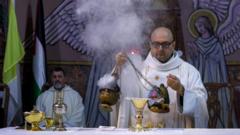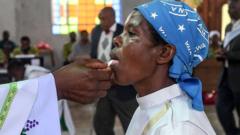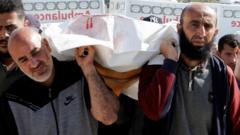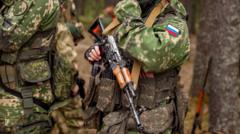**Local Catholics express their grief and apprehension about the future without the Pope's comforting presence.**
**Gaza's Christians Grieve the Loss of Pope Francis: "We Are Orphans Now"**

**Gaza's Christians Grieve the Loss of Pope Francis: "We Are Orphans Now"**
**As the tiny Christian community in Gaza mourns Pope Francis, they reflect on his supportive role during the war.**
In the aftermath of Pope Francis's passing, the minuscule Christian community in Gaza finds itself grappling with an immense sense of loss. The Pope had formed a unique bond with this group, which is one of the last remaining in a predominantly Muslim enclave of over 2 million residents. For 18 months during a prolonged conflict, his nightly calls to the Holy Family Catholic Church provided solace and a lifeline.
The Holy Family Catholic Church in Gaza City, where numerous Christians have sought refuge, was a focal point of connection for Francis, who often enquired about their wellbeing with warmth and humor. "What did you eat today?" he would ask in Italian, often recalling details from previous conversations that underscored his commitment to their plight. Father Gabriel Romanelli noted the Pope's ongoing concern, even when communications were hindered during more turbulent bombing periods.
George Anton, the church's emergency coordinator, expressed the mixed emotions he felt during their conversations. Having shared his own hardships, including losing family members and his home, Anton recalled the Pope's encouraging words, as he offered blessings and sought ways to assist. "He always asked, 'What more can I do for you?'" Anton shared, emphasizing the Pope's genuine desire to support Gazans amid their struggles.
In this time of mourning, Gaza's Christians liken their relationship with the late Pope to that of orphaned children, shedding light on how profoundly his absence will be felt. "We felt like 'Oh my God, we're like orphans now'," Anton said. His heartfelt remarks illustrated the significance of the Pope's daily interactions which provided not just spiritual sustenance but also emotional solidarity.
Pope Francis's connection to the Holy Land dates back to his 2014 visit, which remains etched in memory for its unexpected acts of solidarity, such as praying for peace at the Israel-Palestine barrier. In his last public appearance, he again called for peace in Gaza, a sentiment echoed by Cardinal Pierbattista Pizzaballa, who praised the Pope for his moral clarity and outspoken stance on the conflict.
However, condemnation of violence can create diplomatic rifts. Israeli officials, while expressing condolences, have been notably reticent in their responses, reflecting the fraught political atmosphere exacerbated by the Pope's criticisms of Israel during the ongoing Gaza war. In a controversial statement last year, Pope Francis described the conditions in Gaza as potentially genocidal, a claim that Israel has vehemently denied.
As a conclave meets in Rome to choose his successor, both Palestinians and Israelis will keenly observe how the new Pope approaches their interwoven narratives and search for lasting peace. The hope of Gaza's Christians rides on a leader willing to advocate for their continued existence and welfare amidst an enduring conflict.





















